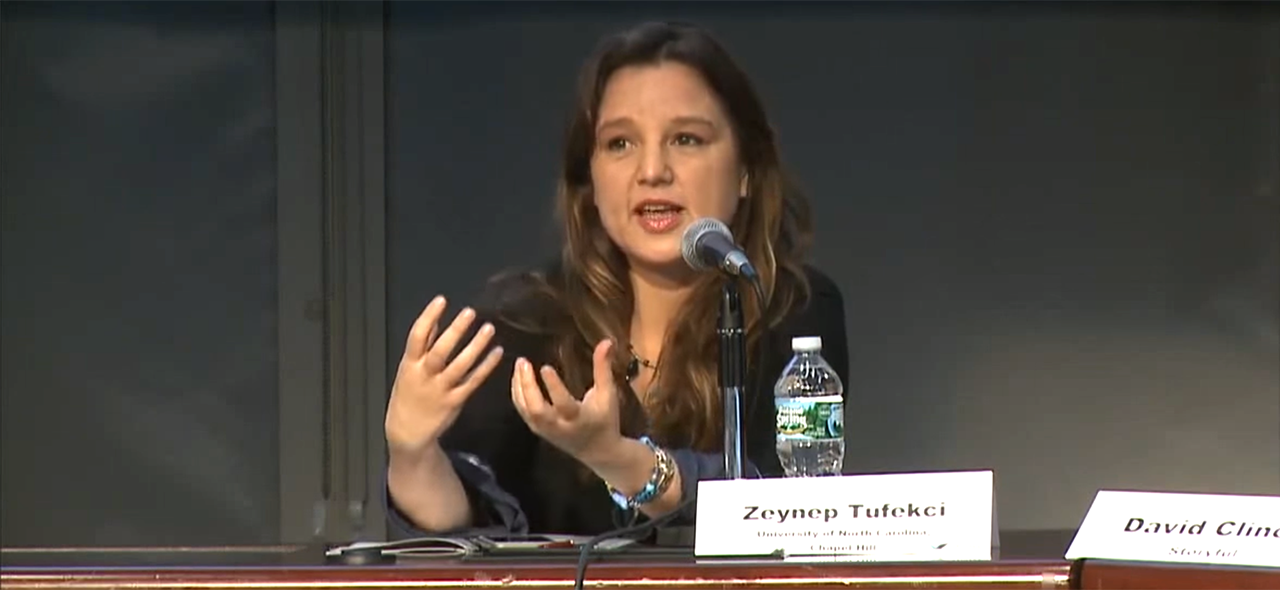
Tow Center conference explores changing relationship of social platforms and news publishers
Claire Wardle is research director for the Tow Center for Digital Journalism at Columbia Journalism School. In January Knight Foundation announced $3 million in new support for Tow to fund research and news experiments that explore the changing relationship of journalism and technology, while helping newsrooms and educators meet the information needs of communities. Photo: Zeynep Tufekci, at Univ. of North Carolina Chapel Hill.
On Nov. 12, the Tow Center for Digital Journalism at Columbia Journalism School hosted its annual research conference, which this year focused on the prescient topic “Journalism and Silicon Valley.” The daylong conference featured seven panels with issues ranging from funding journalism to the ways in which newsrooms are creating content specifically designed to work on social platforms.
The conference brought together journalists, academics, technologists and media executives to debate what happens to platforms as they establish themselves as publishers of content that also dictate the business terms for journalism. The day began with a keynote conversation between Tow Center Director Emily Bell and Mark Thompson, CEO of The New York Times Co. Thompson emphasized that publishers such as The New York Times have to experiment with new opportunities while aggressively building their own destinations. A lunchtime talk with Michael Reckhow, product manager of Facebook’s Instant Articles, explored the features the social network is offering journalists.
Reckhow discussed the promise of Instant Articles, which debuted in May. “Publishers have come to us,” he said, citing the broad reach of Facebook and its ability to mediate the process of entering new markets as incentives for publishers to work with his team. He rebuffed the suggestion that Facebook traffic to publishers was “plummeting,” saying that recent statistics had reflected only desktop traffic and not mobile.
In a panel discussion of storytelling on new platforms, Raney Aronson, executive producer of Frontline on PBS, debuted a Frontline-produced 360-degree video about the Ebola outbreak that was published on Facebook. Trushar Barot, mobile editor at BBC World Service and a Tow Fellow, demonstrated how the BBC used WhatsApp to cover the Ebola epidemic.
In the closing session of the day, financiers, entrepreneurs and owners discussed the problems created by platforms in terms of economies of scale, access to capital and the prospect of sustainable revenue. Neil Barsky, founder of The Marshall Project, argued that he saw a resilient future but not necessarily a profitable one. Shane Snow, the founder of Contently, said he believes that funding journalism should become part of every organization’s corporate responsibility remit.
The conference generated a number of important questions, including:
- Will we ever understand the decisions that are underlying algorithms for news curation?
- How have platforms changed newsroom management and workflows in news production?
- Are platforms constraining the form that journalism can take or spurring innovation?
- Who is holding platforms accountable for editorial decisions?
Danny Funt, of Columbia Journalism Review, wrote up the event, and the magazine also published an analysis piece about the conference. As part of its research conference, the Tow Center also launched two new reports: “Guide to Chat Apps” and “Guide to Crowdsourcing.”
Email Claire Wardle via [email protected] and follow her on Twitter @cward1e.
Recent Content
-
Journalismarticle ·
-
Journalismarticle ·
-
Journalismarticle ·


